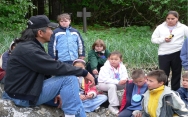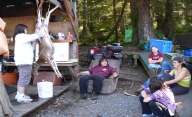Lingít haa sateeyí, we who
are Tlingit: Contemporary Tlingit identity and the ancestral relationship
to the landscape
Dissertation Defense by Vivian Martindale
March 18, 2:00 PM, Media Classroom, Rasmuson Library

Hoonah City Schools at Glacier Bay |
|

Dog Point Lingit language immersion camp |
Video of the public defense:
http://ankn.uaf.edu/media/videos/VivianPhDDefense.mov
(45.6 MB) Abstract
Divergent views on the Tlingit ancestral relationship to the landscape of
Southeast Alaska often leads to conflicts between western-oriented government
agencies, public entities, and the Tlingit people themselves. To better
understand this relationship, nine personal narratives were gathered from
research participants within the Tlingit nation. The narratives provide
insight into the dynamics at the intersection of conflicting worldviews
and the role this plays in shaping contemporary Tlingit identity. The research
has illuminated three factors influencing contemporary Tlingit identity:
the loss and struggle with maintaining the Lingít language, implementation
of subsistence regulations and resultant conflicts, and diminishment of
the ceremony called a kóo.eex’ (a memorial party). In addition,
within the Tlingit worldview there are oral histories, traditional values
and concepts such as balance, respect, and at.óow which define ancestral
relationships and identity. These findings also reveal that the means of
imparting cultural knowledge and worldviews have changed.
|